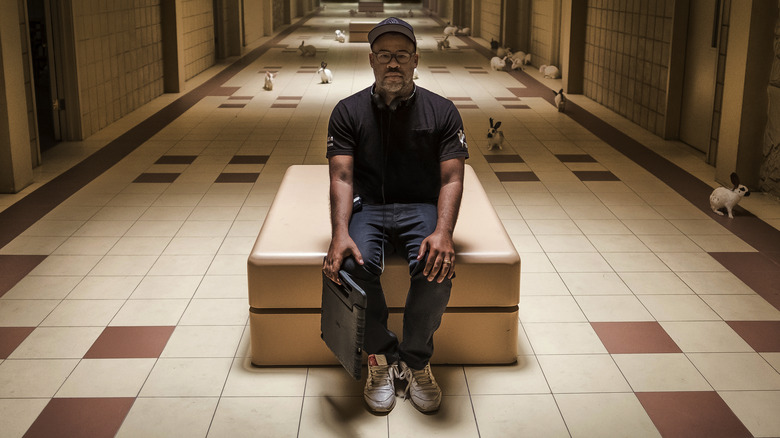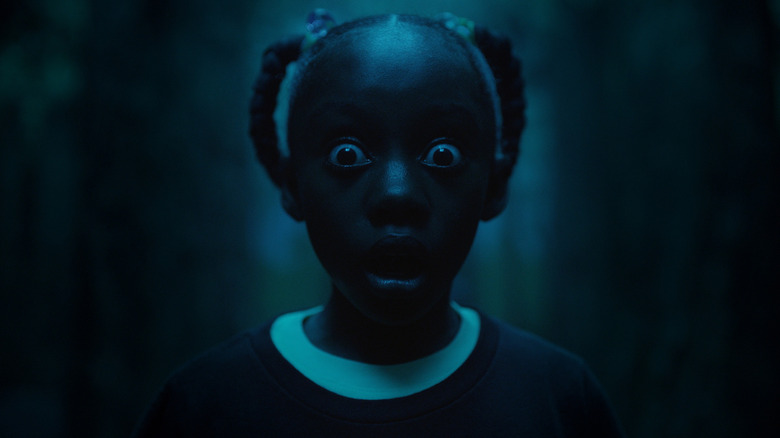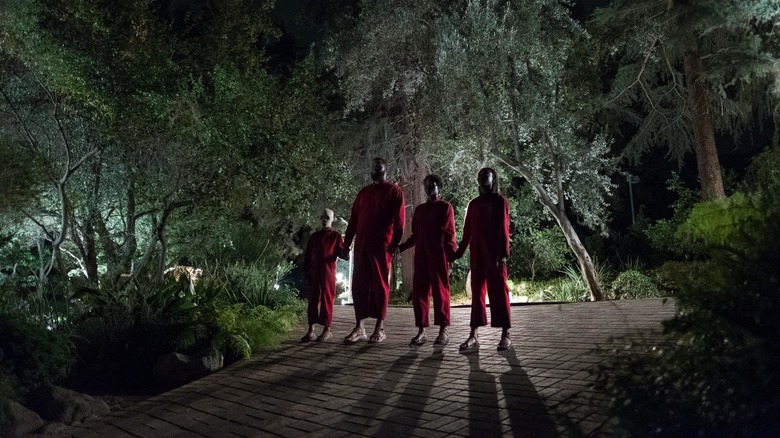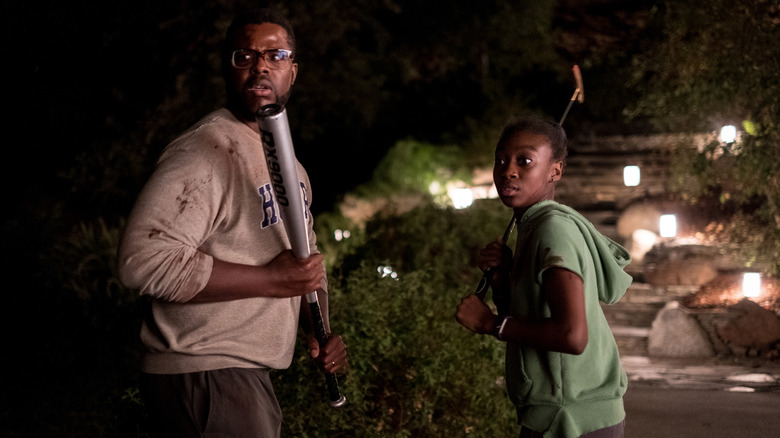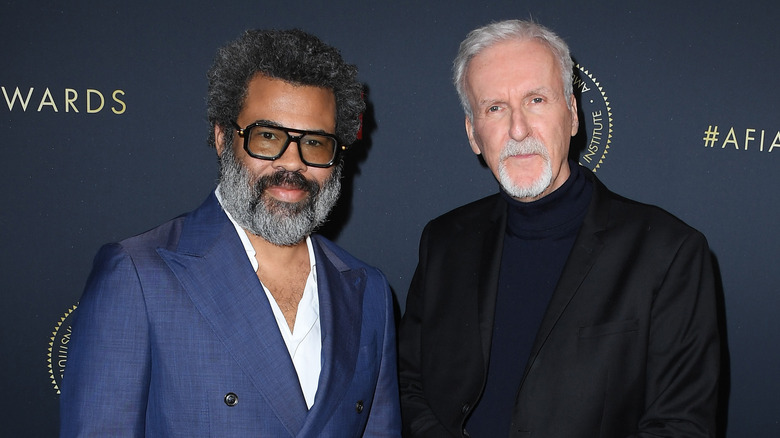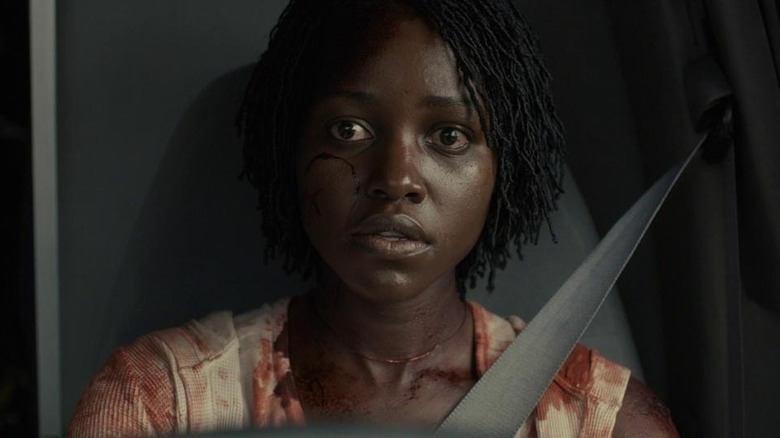Us Was The Box Office Hit That Gave Jordan Peele True Power In Hollywood
(Welcome to Tales from the Box Office, our column that examines box office miracles, disasters, and everything in between, as well as what we can learn from them.)
Jordan Peele has achieved, in a relatively short time, what many other directors only dream of achieving. Not only is Peele capable of crafting hits that deliver the goods both critically and commercially, but his name means something to audiences now. His ideas and his name are enough to sell a meaningful number of tickets, not unlike Quentin Tarantino or Christopher Nolan. It's rare air, and it's a powerful tool in Hollywood. There was a very specific moment where it became clear that Peele did, indeed, have this power, and it came in 2019 when "Us" hit theaters.
Before making himself known to the world as a visionary filmmaker, Peele broke out via comedy, primarily with his comedy sketch show "Key & Peele." So it was more than a little surprising when he stepped behind the camera for a horror movie in the form of 2017's "Get Out." But that movie became not just a breakout hit, but one of the most celebrated genre movies of the last 20 years (if not longer). It also earned Peele an Oscar for the film's script, taking home the award for Best Original Screenplay in addition to securing a Best Picture nomination. To call it a hit would be an understatement. But an important question lingered: Could Peele do it again?
The answer was a resounding yes. In this week's Tales from the Box Office, in honor of the movie's fifth anniversary, we're looking back at Jordan Peele's sophomore effort "Us." We'll go over how the movie came to be, what inspired him to make this wild doppelgänger tale, what happened when the movie hit theaters, how Peele has used his star power in the years since, and what lessons we can learn from it in the here and now. Let's dig in, shall we?
The movie: Us
Aside from the heaps of critical praise it received upon release in 2017, "Get Out" was also a gigantic money-maker, pulling in $255 million worldwide against a tiny budget of less than $5 million. Praise can get a filmmaker far in this world, but money is the language that everyone in Hollywood speaks. That being the case, Universal Pictures was more than happy to get back into business with Peele for his second feature. That project revealed itself to be "Us," a movie about a Black American family on vacation that winds up pitted against terrifying doppelgängers of themselves.
While "Get Out" was labeled as a "social thriller," perhaps to distance it from the horror genre that is so often regarded as a lesser genre for some reason, Peele didn't mince words with his second feature. "'Us' is a horror movie," the filmmaker wrote on Twitter just ahead of the film's release in 2019. The film itself was inspired by several touchstones of the genre in crafting the film. One was "The Twilight Zone" (which he also rebooted for CBS), specifically the episode titled "Mirror Image." He was also inspired by a pair of Alfred Hitchcock classics in the form of "Vertigo" and "The Birds." Peele had this to say in a 2019 interview ahead of the film's release:
"The Hitchcock aesthetic and his sort of study of place in the Bay Area is fairly unique in film. I wanted not only to revisit that but put a Black family in the center of it. I think I often ask myself, 'what if Hitchcock worked with Black actors?' Those are my favorite movies that have never been made."
Jordan Peele goes bigger on Us
Peele had to get very creative to make "Get Out" work on a shoestring budget. But working under constraints also allowed Blumhouse to take a chance on what certainly did not seem like a sure bet at that time. However, when it came to "Us," Peele had proven himself a good enough commercial bet to command a bigger budget. Universal put up $20 million for the director's sophomore effort, which helped secure bigger set pieces, visual effects from the legendary Industrial Light & Magic, and one heck of an ensemble cast. It felt like a real John Hammond "spared no expense" situation, even though we're still talking about a lower-budget film by big studio standards.
The cast was headlined by Oscar-winner Lupita Nyong'o ("12 Years a Slave"), with Winston Duke ("Black Panther"), Elizabeth Moss ("The Handmaid's Tale"), and Tim Heideker ("Tim and Eric Awesome Show, Great Job!") along for the ride. Young newcomers Shahadi Wright Joseph and Evan Alex also got to showcase their talents with some meaty roles. The plural there is important, as every member of the cast was also playing a doppelgänger of themselves.
That presented every actor with the chance to really go for it. Nyong'o, in particular, really stretched herself, playing the leader of what audiences come to know as the Tethered. Nyong'o has spoken about the "dark" places she had to go to in order to occupy her characters, particularly Red. For her, it was more about investigating the character's motivation, rather than getting lost in labeling her as evil.
"When you watch these scary movies, the evil is so ominous that it feels larger than life. To try and embody that can be quite daunting. So, it was about just really deeply investigating the character's emotional motivation and being situated in that and allowing that to magnify the character."
The financial journey
So much about "Us" was kept secret right up until the first trailer was released. Peele still likes to keep an air of mystery around his projects, which almost feeds into the audience's desire to see them at this point. But when the marketing kicked in, it kicked in hard. That first trailer for "Us" was captivating, in no small part thanks to that brilliant remix of "I Got 5 On It." It also didn't hurt that Universal got to put "from the director of Get Out" on the posters. Following a buzzy premiere screening at SXSW in Austin, Texas, audiences were ready to see Peele's next cinematic nightmare.
"Us" hit theaters on March 22, 2019, and easily took the number one spot for the weekend, handily topping "Captain Marvel," which was in its third weekend. Peele's second directorial effort opened to a whopping $71.1 million, which blew away projections heading into the weekend. It ranked as the biggest opening weekend for an original movie since James Cameron's "Avatar" at that time, and was the biggest opening weekend ever for an original horror movie. It was an instant smash.
The film was forced to surrender the crown to Tim Burton's "Dumbo" the following weekend, but it didn't matter one bit in the grand scheme of things. "Us" finished its theatrical run with $175 million domestically to go with $81 million internationally for a grand total of $256 million worldwide — almost exactly as much as "Get Out" made during its theatrical run.
The film made too much money for any amount of creative accounting to hide, and was estimated to have pulled in a total profit of $119 million. The only perceivable downside is that audiences were a bit more mixed on this one than they were with "Get Out." But again, money is the metric that matters most in Hollywood, and Peele delivered the goods once again. His success was not a fluke, to be certain.
Jordan Peele gains rare power in Hollywood
Mere months after the success of "Us," Universal Pictures announced that it had signed Peele and his Monkeypaw Productions banner to a five-year first-look deal. And it's not as though this was some J.J. Abrams situation where the filmmaker's perceived value came from rebooting pre-existing IP. Largely, Peele's value comes from his original artistic vision. Universal Entertainment Group chairman Donna Langley had this to say at the time:
"Jordan has established himself as a premier voice and original storyteller with global appeal. He is leading a new generation of filmmakers that have found a way to tap into the cultural zeitgeist with groundbreaking content that resonates with audiences of all backgrounds."
In the years since, Peele directed his third movie "NOPE," which had the biggest opening for an original movie since (checks notes) "Us." That film was a more modest success, pulling in $172 million worldwide against a more hefty $68 million budget. Even so, audiences once again demonstrated a willingness to turn up for his original ideas. That's not easy to do, particularly in the franchise-dominated landscape we currently live in. Sure, Peele occasionally plays with established IP, like "The Twilight Zone," but even then he's allowing original stories to be told within a brand.
To that end, he has also, as a producer, used his powers for good, co-writing and producing Nia DaCosta's "Candyman," as well as producing the Oscar-nominated "BlacKkKlansman." He also wrote Netflix's acclaimed "Wendell and Wild." More recently, he rescued Dev Patel's directorial debut "Monkey Man" from Netflix, and it will now get a big theatrical release from Universal. Peele is using his powers for good to help get other filmmakers a foothold in the business. And, not for nothing, most of what he's attached his name to has been successful over the last five years.
The lessons contained within
The lessons here, for my money, are crystal clear. For one, it's downright incredible that Jordan Peele stuck to his guns and bet on himself in the aftermath of the success of "Get Out." He assuredly had offers to take on big, flashy franchise projects. Heck, he could have made an "Akira" movie but turned it down because, as he put it, "At the end of the day, I want to do original stuff." So do many other filmmakers, but he was actually provided the platform to do so.
"Us" kept Peele's hot streak alive and, in the years since, he has only ever invested more in original stories, be it his own or from other filmmakers. Even when he touches IP, like with "Candyman," he's investing in original voices, in that case Nia DaCosta. Peele has not only used his success to continue telling original stories for himself, but he's leveraged that success to help bolster even more stories that might otherwise have not seen the light of day. Or, at the very least, they wouldn't have been given the prestige they were afforded when Peele came on board. That's not just power — that's using one's power for good.
Peele could have done the easy thing by making a sequel to "Get Out" or another movie in the "Us" universe, and it seems he at least considered both of those things. But he has resisted the obvious choice at every turn, instead doing something unexpected that still manages to be profitable for all involved.
It might have been, in another world, that we talk about Jordan Peele the way we for a time talked about M. Night Shyamalan, desperate to rediscover the man who made "The Sixth Sense." Peele has avoided the crash from the highest of highs and it was "Us" that showed both critics and audiences that he was more than a one trick pony. It was just one of many more tricks to come.
